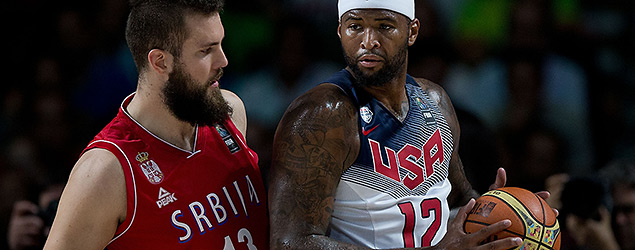Serbia and the United States faced off in the championship game of the 2014 FIBA World Cup of Basketball for the first time, but there is a long history between the two nations.
If you follow Serbia’s FIBA lineage stretches back to the 1950s when it was still part of Yugoslavia.
Up until 1990 when war tore the country apart and divided it into six republics — Serbia, Croatia, Slovenia, Bosnia, Montenegro and Macedonia — Yugoslavia was the most successful basketball nation in the world; even better than the U.S., which was fielding college players at the time. Yugoslavia won three FIBA world titles from 1970-90, winning in ’70 as the host nation and won two more times in 1978 and 1990.
During that stretch, Yugoslavia and the Soviet Union were the two biggest rivals of the United States. While the Americans and Russians collected most of the medals at the Olympics, Yugoslavia was piling up the FIBA World Cup titles. They won three as the former Yugoslavia and two as Serbia.
After an eight-year break because of conflict, Yugoslavia returned to the World Cup stage in 1998 and won the FIBA title for the fourth time in Greece. Four years later, the Serbians had their crowning achievement when they claimed their fifth world title in Indianapolis, Indiana. That team — led by Serbian legends Vlade Divac, Peja Stojakovic and Dejan Bodiroga — may have been Yugoslavia’s best post-war squad. It was one of three countries (along with Argentina and Spain) to beat a U.S. squad made up of NBA players. It was the first losses for Team USA since the 1992 Olympics when the Dream Team was formed.
The 2002 FIBA World Cup was the last time Yugoslavia (now Serbia) reached the final, until the 12-year drought was broken in when Serbia reached the final against the U.S. in Spain 2014.
The Americans dominated the game, winning 129-92, behind 26 points from Kyrie Irving and 23 points from James Harden. Klay Thompson and Kenneth Faried both had 12 points; Rudy Gay and DeMarcus Cousins each had 11. Cousins also had a game-high nine rebounds in just 16 minutes.
Irving and Faried were named to the all-tournament team, along with Spain’s Pau Gasol, Serbia’s Milos Teodosic and France’s Nic Batum. Irving was named tournament MVP.
The U.S. completed a perfect 9-0 record at the World Cup, and became the third nation to win back-to-back FIBA World Cup titles. The other two countries to pull off the feat are Yugoslavia and Brazil.
Team USA now has a record five FIBA world titles.
Faried said he was a little disappointed that Spain didn’t reach the final because he and his teammates wanted to beat the Spaniards on their home soil before their home crowd.
The much-anticipated showdown between the top-ranked Americans versus the No. 2-ranked Spaniards never materialized, as France ousted Spain in the quarterfinals. A France-USA matchup in the championship would have been a delight as well, but the French fell to Serbia in the semifinals.
Imagine if Serbia, Slovenia and Croatia were still part of Yugoslavia. Slovenia’s Goran Dragic could be in the backcourt with Teodosic. Crotian big men Ante Tomic and Dario Saric could be paired with Serbia’s Nenad Krstic. And the squad will field not one but two Bogdanovics — Bojan and Bogdan. Both are sharpshooters and natural-born scorers.
Now that group could give Team USA a run for its money. Unfortunately, the world won’t be able to see it.
